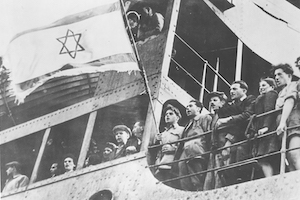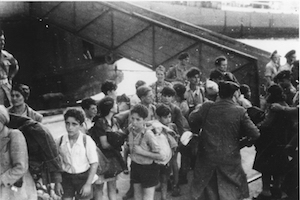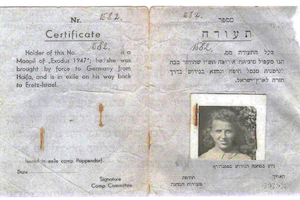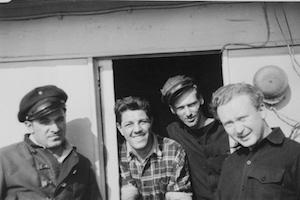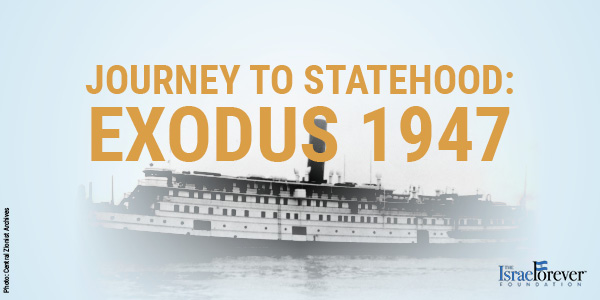The Exodus 1947: A global cry for Jewish justice
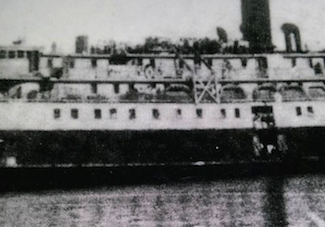
SS President Warfield later known as The Exodus 1947
Exodus 1947, a ship during the time period called ‘Aliyah Bet’ that tried to come into Palestine, was one of the main contributors to the continuity of the Zionist dream.
One of many boats that tried to make its way into Palestine in the aftermath of World War II and the time of the Declaration of Independence of the State of Israel, the Exodus made history as it drew attention to the ongoing plight of the survivors of the Holocaust wanting nothing more than to arrive to their homeland in Palestine, the Land of Israel.
The Exodus ship had its early beginnings under the name of SS President Warfield which was originally launched in 1928. Having sailed the Chesapeake Bay between Baltimore, Maryland and Norfolk, Virginia for over a decade, the ship was then transferred to the British under the Lend Lease agreement and later deployed in the Normady Invasion by the US.
In 1945 the ship was deactivated from wear and tear from her military service. It was then in 1946 that the Haganah, Jewish military organization, bought the ship for $8,000 as scrap by the Western Trading Company as a front for the Haganah, the future Jewish military organization.
It was the motivation and efficiency of American Zionists determined to help survivors find refuge outside the displaced persons camps in Europe that made it possible to purchase, navigate and staff the boat.
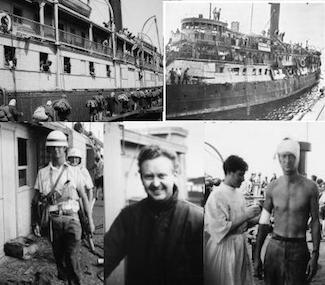
Clockwise: Holocaust survivors from Displaced Persons camps in Germany prepare to board Exodus 1947, then known as President Warfield, in Sete, France. *** Exodus 1947 as it looked when it was towed into Haifa harbor. It received the hole in its side when a destroyer rammed it. Continual sideswiping by British naval craft splintered the length of its sides. *** A nurse bandages Murray Aronoff of New York City, Exodus 1947 seaman wounded in the battle to repel the boarding party of Royal Marines. *** Bill Bernstein, 24, of San Francisco, second mate of the Exodus, was clubbed to death by Royal Marines as he attempted to defend the wheelhouse. He was the first of 40 Americans and Canadians to die on the side of Israel in its fight for independence. *** An officer from the Royal Marines walks down the main deck of the captured ship. The British won the battle. In the final accounting, Exodus 1947 won the war.
Most of the funds used to procure the vessel, and almost all of its crew of 35 volunteers came from the American Jewish community, put their lives on the lines to direct the refugee journey from the camps to the harbor, onto the ships, through the waters and even through battle, giving expression to the eternal bond between Jews in the diaspora and the Land of Israel as well as the age-old dictum that all Jews are responsible for one another.
Although many were experienced marines having served in World War II, other volunteers were inexperienced yet knew the vast importance of this mission and were committed to its success. As Zev Siegel, an American crew member of the ship, recalls “I had no choice, from the point of view of my conscience...Here I was, this kid living fat and sassy, driving around D.C., when there were 250,000 survivors of the Holocaust who were living in the same kind of camps as the concentration camps. I felt God had given me the privilege to do something.”
Sentiments like this were prominent among young Jews in America at that time, whose emotions were charged by the hope of fulfilling the Jewish nationalist dream for the sake of survivors who had suffered so much. The question in many people’s minds was how many Jews could have been saved had the borders to Palestine been open for Jewish emigration out of Nazi Germany and occupied Europe? They were willing to risk their lives to ensure that these remnants of a destroyed world could be brought home.
MEET THE CREW OF THE "EXODUS 1947"

Crew Members of The Exodus 1947
DENMARK
Katzenelson, Zvi
MEXICO
Margolis, Ruben
Segal, Ze’ev (Vevie)
UNITED KINGDOM
Cohen, Joshua, Dr.
UNITED STATES OF AMERICA
Aranoff, Murray Marks, Bernard Aras, Joe Miller (Milla), Bernard (Dov) Baer (Belari), Shmuel Millman, David Baruch, Kurt Millman, William Bernstein, William (Bill) Nadler, Nat Foreman, Bentley Naftali, Al Goldstein, Myron Rofe, Roger Grauf, John (N/J) Rosenfeld (Vardi), Teddy Kalmanowitz (Kalm), Eli Russel, Jack Kochavi (Storek), David Schulman, Samuel Kolomeitzer (Cole), Arye Segal (Syval), Avraham Lavine, Frank Selove, Lou Leidner, Harold Sklar, Lenn Lester, Sol Stanczak, Frank Lipshitz (Livney), Arthur (Avi) Weinsaft, Harry Lowenthal, David Weinstein, Cyril (Cy) Malik, Louis Weiss, Mike Malovsky, Daniel
As Rafael Medoff, director of the Washington-based David S. Wyman Institute for Holocaust Studies says “It is no surprise that many Americans sympathized with the Jewish immigration struggle, given its strong parallels to American history. Refugees from persecution were trying to build a country based on liberty and equality, only to be blocked.” He believes that “The important role of American volunteers on the Exodus is a reminder that the struggle to establish Israel was supported by a broad coalition of Americans of all faiths — and that support for Jewish statehood continues among Americans to this day”.
THE BRITISH AND THE EXODUS
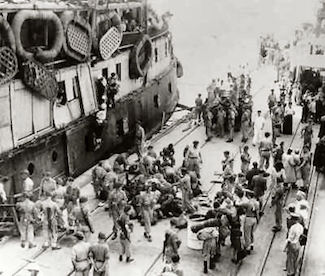
The Exodus 1947 at the Port of Haifa
After the monumental Balfour Declaration, Great Britain was an avid supporter of the creation of a Jewish sovereign home in our native land of Israel. As the political realities on the ground grew more tense between the Arab nations and the Jewish movements for settlement and immigration, the British found themselves in a the problematic role of governing Palestine.
In the wake of the “The White Paper of 1939” which limited access of the Jewish people into Palestine, the limitations imposed on Jewish immigration made for increased tensions between the British and the Jews. The British knew that the Jews were trying to return to Palestine and the British would try everything in their power to stop the Jewish people from doing so, causing them to be increasingly suspicious of activity of boats such as the Warfield-soon-to-be-Exodus.
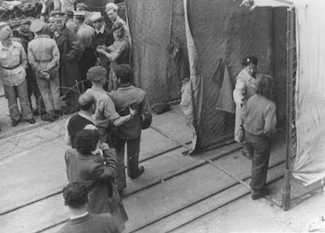
British soldiers force through a disinfection station before deporting them to detention camps in Cyprus. Haifa port, Palestine, April 24, 1947.
Almost immediately after disembarking from the French port at Sete, the Exodus was followed by a British armada fleet that grow, upon arrival to the coast of Haifa, to 12 ships, including 3 destroyers and a cruiser, determined to stop the ship and, inevitably, crush the dreams of the survivors of the Holocaust.
The violent boarding and attack on the Exodus, compounded by the refusal to allow the survivors to disembark in Haifa, aroused awareness by activists, the media and Jewish communities across the globe. Word got out that the Jews were being transported onto prison ships and returned to Europe to be housed in detention camps in Germany where they were forced to confront the nightmares and ghosts of their survival from the concentration and labor camps. Attention was drawn and it aroused action, targeting the British as the “new Nazis”
GLOBAL SUPPORT
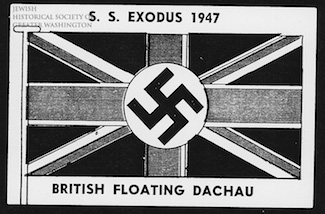
Exodus protest sticker
Despite the atrocities they had experienced under the Nazis, the British were increasingly identified in the media as the enemy of the Jews who were simply trying to reach freedom. Many rallied to the cause of increasing public awareness and international support, inevitably voicing recognition of the Jewish nationalist dream. There were two main countries that truly helped the people survive and thrive: France and the United States.
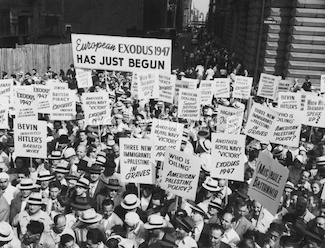
Americans protest against the actions of the British Navy in boarding and taking over the Exodus
From the beginning of the effort, it was clear how instrumental was the role of the United States. Through the growth of American sympathy, compassion, and dedication, the Exodus was able to be what it was. However, the French also attempted to reconcile their past silence in the face of Jewish persecution and refused the British order to force the Jews off the prison ships upon their return to Europe. Moreover, they gave food and medical aid to the passengers and even encouraged their continued struggle to be returned to Palestine. Nonetheless, their efforts were in vain as the Jews were sent back to Germany.
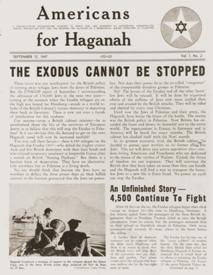
Front page of the American Zionist newspaper, "Americans for Haganah" of September 15, 1947, featuring articles about the Exodus 1947. © United States Holocaust Memorial Museum
It is believed that these events were instrumental in swaying the positions of many countries and communities toward the establishment of a Jewish state in Palestine. Throughout the journey of the Exodus 1947, more and more people around the world rallied in favor of fulfilling the hope of the Jewish people for a safe haven and it was clear that Mandate Palestine was not the solution.
It was only 1 month later that the United Nations vote in favor of the Partition of Palestine into a state for the Jews and a state for the Arabs in Transjordan that it was clear how much the Exodus influenced world opinion. Indeed, it was a global cry for Jewish justice that brought about the final step toward the declaration of statehood to ensure Jews would never have to be refugees again.

Dr. Elana Yael Heideman, Executive Director of The Israel Forever Foundation, is a dynamic and passionate educator who works creatively and collaboratively in developing content and programming to deepen and activate the personal connection to Israel for Diaspora Jews. Elana’s extensive experience in public speaking, educational consulting and analytic research and writing has served to advance her vision of Israel-inspired Jewish identity that incorporates the relevance of the Holocaust, Antisemitism and Zionism to contemporary issues faced throughout the Jewish world in a continuous effort to facilitate dialogue and build bridges between the past, present and future.
Recommended for you:
JOURNEY TO STATEHOOD: EXODUS 1947
Learn more about The Exodus 1947 today!
About the Author


